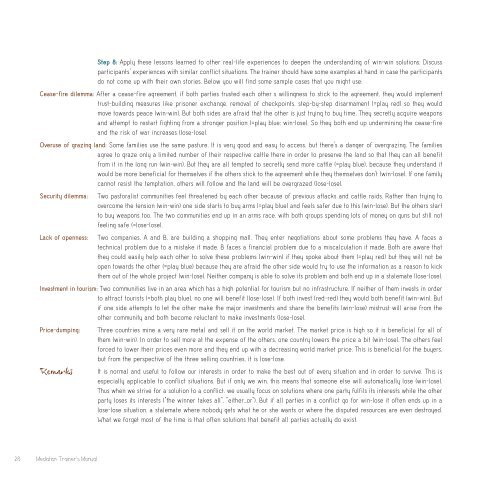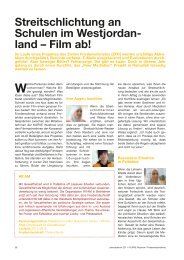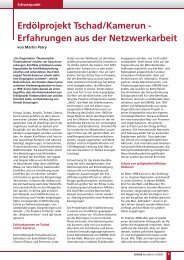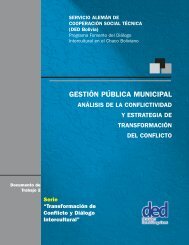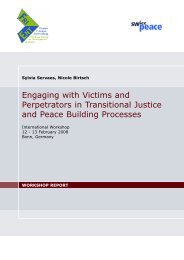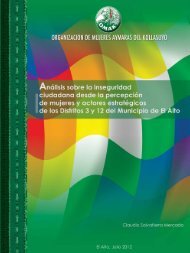Merging Ethiopian Wise-Counsel Mediation and Facilitative ...
Merging Ethiopian Wise-Counsel Mediation and Facilitative ...
Merging Ethiopian Wise-Counsel Mediation and Facilitative ...
- No tags were found...
You also want an ePaper? Increase the reach of your titles
YUMPU automatically turns print PDFs into web optimized ePapers that Google loves.
Step 8: Apply these lessons learned to other real-life experiences to deepen the underst<strong>and</strong>ing of win-win solutions. Discussparticipants' experiences with similar conflict situations. The trainer should have some examples at h<strong>and</strong> in case the participantsdo not come up with their own stories. Below you will find some sample cases that you might use:Cease-fire dilemma: After a cease-fire agreement, if both parties trusted each other’s willingness to stick to the agreement, they would implementtrust-building measures like prisoner exchange, removal of checkpoints, step-by-step disarmament (=play red) so they wouldmove towards peace (win-win). But both sides are afraid that the other is just trying to buy time. They secretly acquire weapons<strong>and</strong> attempt to restart fighting from a stronger position (=play blue; win-lose). So they both end up undermining the cease-fire<strong>and</strong> the risk of war increases (lose-lose).Overuse of grazing l<strong>and</strong>: Some families use the same pasture. It is very good <strong>and</strong> easy to access, but there's a danger of overgrazing. The familiesagree to graze only a limited number of their respective cattle there in order to preserve the l<strong>and</strong> so that they can all benefitfrom it in the long run (win-win). But they are all tempted to secretly send more cattle (=play blue), because they underst<strong>and</strong> itwould be more beneficial for themselves if the others stick to the agreement while they themselves don't (win-lose). If one familycannot resist the temptation, others will follow <strong>and</strong> the l<strong>and</strong> will be overgrazed (lose-lose).Security dilemma: Two pastoralist communities feel threatened by each other because of previous attacks <strong>and</strong> cattle raids. Rather than trying toovercome the tension (win-win) one side starts to buy arms (=play blue) <strong>and</strong> feels safer due to this (win-lose). But the others startto buy weapons too. The two communities end up in an arms race, with both groups spending lots of money on guns but still notfeeling safe (=lose-lose).Lack of openness: Two companies, A <strong>and</strong> B, are building a shopping mall. They enter negotiations about some problems they have. A faces atechnical problem due to a mistake it made. B faces a financial problem due to a miscalculation it made. Both are aware thatthey could easily help each other to solve these problems (win-win) if they spoke about them (=play red) but they will not beopen towards the other (=play blue) because they are afraid the other side would try to use the information as a reason to kickthem out of the whole project (win-lose). Neither company is able to solve its problem <strong>and</strong> both end up in a stalemate (lose-lose).Investment in tourism: Two communities live in an area which has a high potential for tourism but no infrastructure. If neither of them invests in orderto attract tourists (=both play blue), no one will benefit (lose-lose). If both invest (red-red) they would both benefit (win-win). Butif one side attempts to let the other make the major investments <strong>and</strong> share the benefits (win-lose) mistrust will arise from theother community <strong>and</strong> both become reluctant to make investments (lose-lose).Price-dumping: Three countries mine a very rare metal <strong>and</strong> sell it on the world market. The market price is high so it is beneficial for all ofthem (win-win). In order to sell more at the expense of the others, one country lowers the price a bit (win-lose). The others feelforced to lower their prices even more <strong>and</strong> they end up with a decreasing world market price. This is beneficial for the buyers,but from the perspective of the three selling countries, it is lose-lose.It is normal <strong>and</strong> useful to follow our interests in order to make the best out of every situation <strong>and</strong> in order to survive. This isespecially applicable to conflict situations. But if only we win, this means that someone else will automatically lose (win-lose).Thus when we strive for a solution to a conflict, we usually focus on solutions where one party fulfils its interests while the otherparty loses its interests ("the winner takes all", "either...or"). But if all parties in a conflict go for win-lose it often ends up in alose-lose situation,—a stalemate where nobody gets what he or she wants or where the disputed resources are even destroyed.What we forget most of the time is that often solutions that benefit all parties—actually do exist.28 <strong>Mediation</strong> Trainer’s Manual


